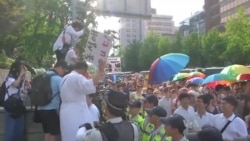In South Korea, the struggle for gay rights cannot easily be categorized as a conflict between Eastern and Western cultural values.
South Korean Lesbian, Gay, Bisexual and Transgender (LGBT) activists have been influenced and inspired by the success of the American and European gay rights movements, but gay marriage opponents in Korea have also been influenced by U.S. activists.
Thousands of gay rights supporters and opponents recently held rival rallies in front of Seoul’s city hall. Supporters of the Gay Pride Festival celebrated the U.S. Supreme Court decision to legalize same sex marriage.
The U.S. gay rights movement has helped raised awareness in Asia on this issue and Korean activists have been encouraged and guided to a degree by the American experience.
“It doesn’t mean that we are following the path of the United States, but we have a similar flow,” said Nam Woong with the activist group Solidarity For LGBT Human Rights Of Korea.
Opponents also say they draw inspiration from abroad. Since the end of the Korean War, Christianity brought by Western missionaries to South Korea has grown from two percent to nearly a third of the population. Many conservative Christians see gay rights as a betrayal of the values they learned from American churches.
“The United States is a country that was established based on Christian values, and South Korean churches are influenced by the United States. I am worried that the values established by the United States are now being destroyed,” said the Reverend Lee Byung-Dae.
Reverend Lee is a spokesperson for the Korean Association of Church Communication, a group he says reaches 45,000 churches.
Christian opponents, so far, have been able to pressure lawmakers in Seoul to reject legal attempts to prohibit discrimination on the basis of sexual orientation.
In 2014, Seoul Mayor Park Won-soon, a vocal proponent for same-sex marriage, withdrew a proposed human rights charter after anti-gay activists staged a sit-in protest at City Hall.
The failed measure specifically protected lesbian, gay, bisexual and transgender South Koreans from discrimination in the municipality's greater region.
Reverend Lee said his gay rights opposition group has not received any assistance from abroad, but they are reaching out to churches in America and Europe to unite to fight what he said is a growing movement to discriminate against Christians.
“We are trying to seriously stop the movement from infringing on the human rights of majority Christians because of human rights of the minority,” he said.
But, like in the West, public support for gays rights in South Korea is growing. In a polls conducted by the Asan Institute for Policy Studies, support for the legalization of same sex marriage in Korea has increased from 16.9 percent to 28.5 percent from 2010 to 2014. Like in the United States, the change in attitude is especially noticeable among younger respondents.
“The history of self-expression is short in South Korea. But the speed of change is much faster here,” said Nam Woong with LGBT Human Rights Of Korea.
The U.S. Embassy set up a booth at the Gay Pride festival in Seoul where supporters could take pictures of themselves with life size photos of President Barack Obama and First Lady Michelle Obama.
Nam said the United States, either through the Seoul embassy or through non-government organizations, has been supporting the Korean gay rights movement since 2003.
He said the assistance includes visits and lectures by American activists, and a counseling program set up by the Astraea Lesbian Foundation for Justice.
The foundation receives funding from the United State Agency for International Development (USAID) to train LGBT individuals to participate in democratic processes. He said international funding also supports a crisis center for LGBT teenagers.
After the U.S. Supreme Court declared the federal ban on same-sex marriage unconstitutional, two South Korean male filmmakers went to court in Seoul as part of a similar legal battle. Kim Chokwangsu and Kim Seung-hwan were married in 2013 in a public wedding and have been seeking legal recognition of their union.
The court this week rejected their request saying, "same-sex marriage does not satisfy the definition of husband and wife in civil law." An advocacy group working with them said they will appeal the court decision and continue to fight for equal rights for all people, no matter their sexual preference.
VOA Seoul Producer Youmi Kim contributed to this report.






